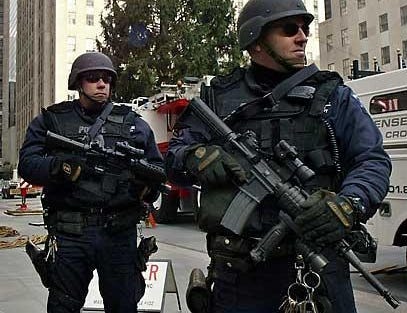Low-Tide for American Police Departments

It’s a tough time to be a cop. Whatever you happen to do in your career, it sure doesn’t help to have the media constantly put you down and make you an object of scorn. God knows, policing is tough enough—99% difficult and routine, 1% life-threatening. Like fighting in a war zone, there’s little warning when one becomes the other.
Our response to that seems to have been to militarize our police. Even the smallest of our cities have Swat Teams and armored vehicles—the armoring-up courtesy of the Department of Defense offloading its surplus materiel.
Just as the airlines find pilots from retired Air Force personnel, our returning war veterans are finding their way to police departments. It doesn’t take much imagination to connect the dots from a war-time ‘them versus us’ mentality to mirroring that within police units. The trusted beat cop image, chatting up those whose respect he earned is fading to black-clad tough guys who don’t take any lip.
All of which is the ultimate price we pay for ‘mission creep’ in both wars and community policing. Those of us on the street or in our cars are eerily edging toward a ‘them versus us’ mentality. Our highly valued American system of respect for law and order is in a death-spiral from grudging to downright fear.
That certainly is enabled by a population increasingly armed to the teeth. A fearful and militarized police are an awesome spectacle to contemplate. Its worst iteration is in poor, high crime communities and the recent killings of unarmed (mostly black) citizens is evidence enough of that. So error piles upon error and the current trend is unsustainable.
One thing that puzzles me is a disturbing tendency to kill rather than wound. A minor traffic offense goes horribly wrong as the panicked driver outruns a tazer and is shot eight times in the back, killing him. A confused school-child is killed for not dropping a toy gun in a mall toy department. Small wonder we have become ‘us versus them.’
Is a bullet in the leg not sufficient? Are police even trained to make non-lethal shots? Certainly not in the military, where soldiers are taught to kill, but police are no longer in the military. The police are in Chicago or San Jose or Paducah, Kentucky—patrolling the streets of a nation not at war.
If we are not at war then we have to appear to be not at war and conduct ourselves as if we were not at war.
Terrorizing citizens by Swat Teams smashing down doors for a reported (and often erroneous) minor drug bust mirrors a state of war and puts community cops who have sworn to preserve and protect at risk. Parading the latest acquired armored personnel-carrier through the streets increases that risk, as does clothing ordinary cops in Swat Team uniforms.
If all we have is a hammer, everything looks like a nail. The famous Pogo cartoon quote comes to mind: “We have met the enemy and he is us.”
Anthropologists, who seldom (if ever) venture from University campuses to ghettos, tell us this is a deep social problem rooted in poverty, joblessness and lack of education—then wring their hands and go back to their comfortable homes for a comfortable dinner with their comfortable family.
They’re absolutely correct. But we don’t have the time to solve poverty, homelessness, mental health, drugs and gangs in ghettos, while access to fairness and justice is denied and the less fortunate share of our society goes down the toilet.
Every agonizing event is on the nightly news. Right or left-wing, whatever source we choose from Jon Stewart to Fox News it’s in our face and moves American society further apart. It’s ‘them’ who are the problem and ‘we’ who can’t possibly understand the circumstances. We are not poverty stricken and we are not in squad cars and Swat Teams. We are not at risk—except that we are. Society is a garment and every thread is intertwined.
There are interventions. We can slow, stop and reverse trends. We can do it now, while anthropologists and sociologists struggle with their long-term solutions and politics mumbles its way through this or that press-release.
In the worst policing situations, ground-zero of us-versus-them, the quickest route to reversal is meaningful outreach to community leaders. Every community has leaders, from preachers to landlords to gang members and as soon as police administrations stop trying to separate the law-abiding from the law-breakers, they’ll begin to get results. Bring them all together. Listen to what all of them need and then move to provide it. Leave your egos, badges and guns at the door and listen. Then move. Begin to build some trust.
De-militarize your force. Send all that heavy armor back to the Defense Department, get your personnel out of those fear inducing black jumpsuits and begin to patrol in proper uniforms. The Philadelphia police patrols on bicycles and there’s evidence that it makes them more mobile and respected.
Make intervention-training a requisite for all uniformed personnel. Lower the expectation of force and you’ll lower the times when it is needed.
Look into procedural justice within your local courts, an idea that in recent months has focused the debate about reforming the US criminal justice system. The idea behind procedural justice is that people are far more likely to obey the law if the justice system does not humiliate them, but treats them fairly and with respect. That begins with the way judges speak to defendants. Google procedural justice. It works.
It’s absolutely low-tide for American police departments. But low-tides don’t last and, in this case, a higher tide may indeed raise all boats. Time is not on the side of law enforcement in the most problematic areas of our wounded cities, but turning the tide is possible and ignoring it is a prescription for further disaster.
No one on either side of the issue wants (or can survive) that.
